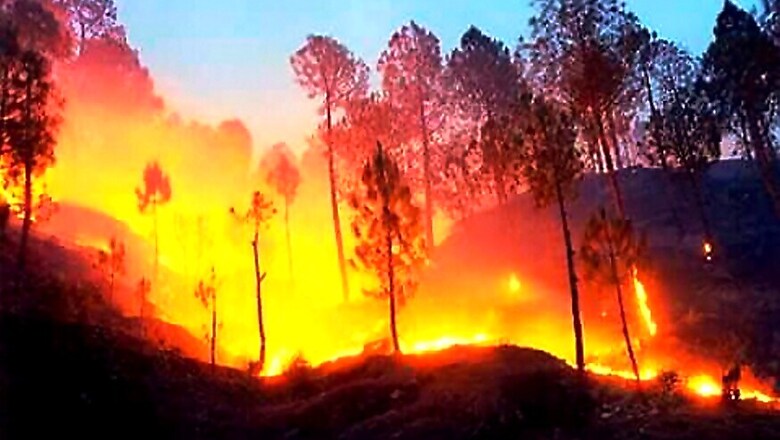
views
"Go thou down quickly to the men's huts in the valley, and take some of the Red Flower which they grow there..." - Rudyard Kipling. The Jungle Book.
If the jungle folks indeed call it the Red Flower, then it has bloomed and blossomed aplenty in Uttarakhand this summer to gut and singe more than 20,000 hectares of lush green forests.
Kunj Kharak, perched at 7,000 feet above sea level, is a ridge about 40 kilometres from Nainital and offers a unique 360 degree view of the tarai plains down below and the Dhaulagiri range up north.
But today, all one sees around is smoke, smoke and more smoke bellowing up from the hills. Beyond that, there is zero visibility.
Forest guard Suresh Ram has just returned from the other side of the ridge. I meet him at the Vinayak forest guest house as he lumbers downhill towards the makeshift kitchen to partake of his first proper meal in the last 18 hours.
"We have been able to save this patch at least. We started well before sunset and worked all night," he says with a sense of achievement. The irony, if anything gets accentuated by a chopper hovering above close by, perhaps on a fire fighting mission.
It is no mean achievement by Ram and his team of six men. A wrong step in the treacherous terrain can mean plunging down several thousand feet. At 800 degrees Celsius, a pine blaze is like an electric incinerator. Ashes to ashes, dust to dust in no time.
The hills have not received proper rains in the last 11 months and face one of the worst droughts in recent years. What is worse, there was no snowfall this winter.
The water springs have all dried up. The mulch-strewn esses amidst moss-coated oaks and divine deodars resemble sal forests in parched plains during peak summer.
Uttarakhand forests were a tinder keg waiting to explode. It was only a matter of time. High velocity winds and low humidity completed the ensemble.
Some villagers have been arrested for starting the fire. Others blame pyrotechnics during baraats and weddings. The temptation, they say, is the rich fodder that will spring out of the gutted forests and meadows after rains.
"Just wait for a couple of days, once the wedding season is over, things will come under control," says District Forest Officer Tejaswani Arvind Patil, as her wireless set crackles incessantly.
In the meantime, someone calls up to put in a word for a gentleman seeking accommodation in a forest guest house.
"I can't," she retorts. "Where will my men put up? They have been up all night."
This 2002 batch IFS officer is battling one of the worst forest fires in the district with meagre resources, meagre man power and meagre support system. The resources in Uttarakhand are as elementary as it can get.
Rakes and sticks – that is all I can see as her men try to confine the fire to the hill side of the road.
Where there used to be water gurgling under some of these culverts, the "red flower" slurps and hisses its way up to ravage and devour more.
It was a disaster waiting to happen. Over the years deforestation and rampant mindless construction has choked natural springs and channels which formed natural fire lines to accidental fires.
The Nainital lake doesn't look bigger than a shriveled pond. The only thing missing is a gang of wallowing buffaloes.
After sunset, it gets cool very quickly. Wren and myna, swallow and thrush chirp about as Ram talks of years gone by.
"The birds never leave their nests and eggs in the face of imminent danger. These fires would have singed - I don't know how many - to death," he rued.
"Khuff, khuff. Khuff, khuff". Ghurad, the mountain goat calls out just a few hundred feet down the slope.
And if there indeed is such a thing as water truces, then the animals are desperately seeking one.
The onus now is upon us, to reciprocate.


















Comments
0 comment